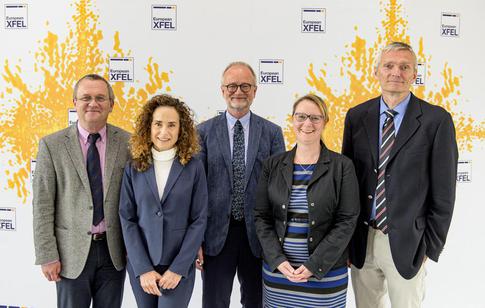XFEL: Questions and answers with Sakura Pascarelli
Questions and answers with Sakura Pascarelli

Sakura Pascarelli (second from left) joined the European XFEL from ESRF at the beginning of September as scientific director. With her, the management board is now complete. From left to right, Serguei Molodstov, Sakura Pascarelli, Robert Feidenhans'l, Nicole Elleuche, and Thomas Tschentscher. Copyright European XFEL
On 1 September Sakura Pascarelli joined the European XFEL from the ESRF. In her role as scientific director she is responsible for the development of the four hard X-ray instruments. She spoke to Rosemary Wilson about her career, her new role and her love for swimming.
How did you get into science?
I spent part of my childhood in Burma and Indonesia. The American school system there enabled you to do lessons at your level, meaning you stayed interested and engaged. I really liked maths which I did with kids a few years older than me. I remember also doing experiments. I liked seeing things explode and break and try to understand why. Later on in Italy, I studied physics – not because I was particularly talented, but because I enjoyed it.
You joined ESRF at a time when the facility was still being built. What parallels can you see between that time, and now here at European XFEL?
I went to the ESRF to build one of the first beamlines there. We didn’t know what we would be able to discover or measure with this new machine. Here at European XFEL I see some of that same excitement. That opportunity taught me so much about instrumentation, and coordinating the construction of a beamline. But it is a different world now. Back then a good scientist with a solid background in physics, X-ray optics or instrumentation, could build a group and build a beamline. That is not possible here. This is so much more complicated. Here you need experts in X-rays, lasers, electronics, detectors. We don’t really know how to measure a femtosecond pulse let alone synchronise it with another laser! To run these instruments we need group leaders who are really good managers. This is so important. It is no longer enough for someone to be just a good scientist. At European XFEL we need to make sure the groups are well structured, well managed and that the people are happy. That might be difficult in the beginning when things don’t work, but when people see that their work is recognized, satisfaction and productivity increases.
What attracted you to the new role as scientific director of European XFEL?
Management, teaching and mentoring has been an important part of my everyday work life since 1997. I have trained a total of 42 people and it is very rewarding to see them grow and accomplish things. I wouldn’t say I love management, but it is very satisfying being able to solve problems and create a more collaborative atmosphere, and see results and papers being produced. After running several groups and beamlines at the ESRF, having the chance to use my skills and experience to contribute to shape the future of European XFEL is very exciting.
What principles would you say are important for your work?
It is important to talk openly with people. I’m here to help and I want staff to come ask for resources so they can be the best they can – and they can count on my support. I hope people realise that I do not want to boss them around. I also want to know how people think we can make things better. If people are happy and productive, I am happy. I can sit at the back and say “wow, I have a great team” I don’t want to be in the front. Very often just talking openly and transparently is the key.
What will your first tasks be?
First I want to meet people. I’ve already started meeting the group scientists but I want to meet all the groups. I want to see the dynamics in the groups, and identify any issues and challenges there might be - especially in the hard X-ray groups which fall under my responsibility.
Another priority will be to strengthen the in-house research program. This is key to the success of the facility. It is the instrument staff who will be pushing boundaries, and discovering what our machine is actually capable of. We don’t really know that yet. We have to allow the staff at the instruments to do their research. This is key to creating the fertilizing context for major discoveries. We want to leave our positive footprint on society.
This starts with our students. We are already discussing ideas about how we might strengthen the student program, which will also be one of my responsibilities. These ideas include financing research projects in house and implementing a student day where students present their work. I really want to develop a European XFEL PhD identity and culture so that students leave having had a really great training and experience.
You started at the beginning of September. What are your first impressions of European XFEL?
Everyone is very friendly and welcoming. I am really happy to be here. I’ve been coming regularly since February when the council appointed me, and even in this short time I notice a difference thanks perhaps also to the important efforts in internal communication being initiated by the management board. There is still a lot more to do, but I see that things are improving.
What do you do to relax?
I swim. I train with a team and compete at a national level. I actually won two medals in the French masters championships in June! I have already found a team I will join here. Competing is not a priority, but I like to train hard. It won’t be easy, because I will have more commitments now but I hope I can manage to swim at least twice a week.
